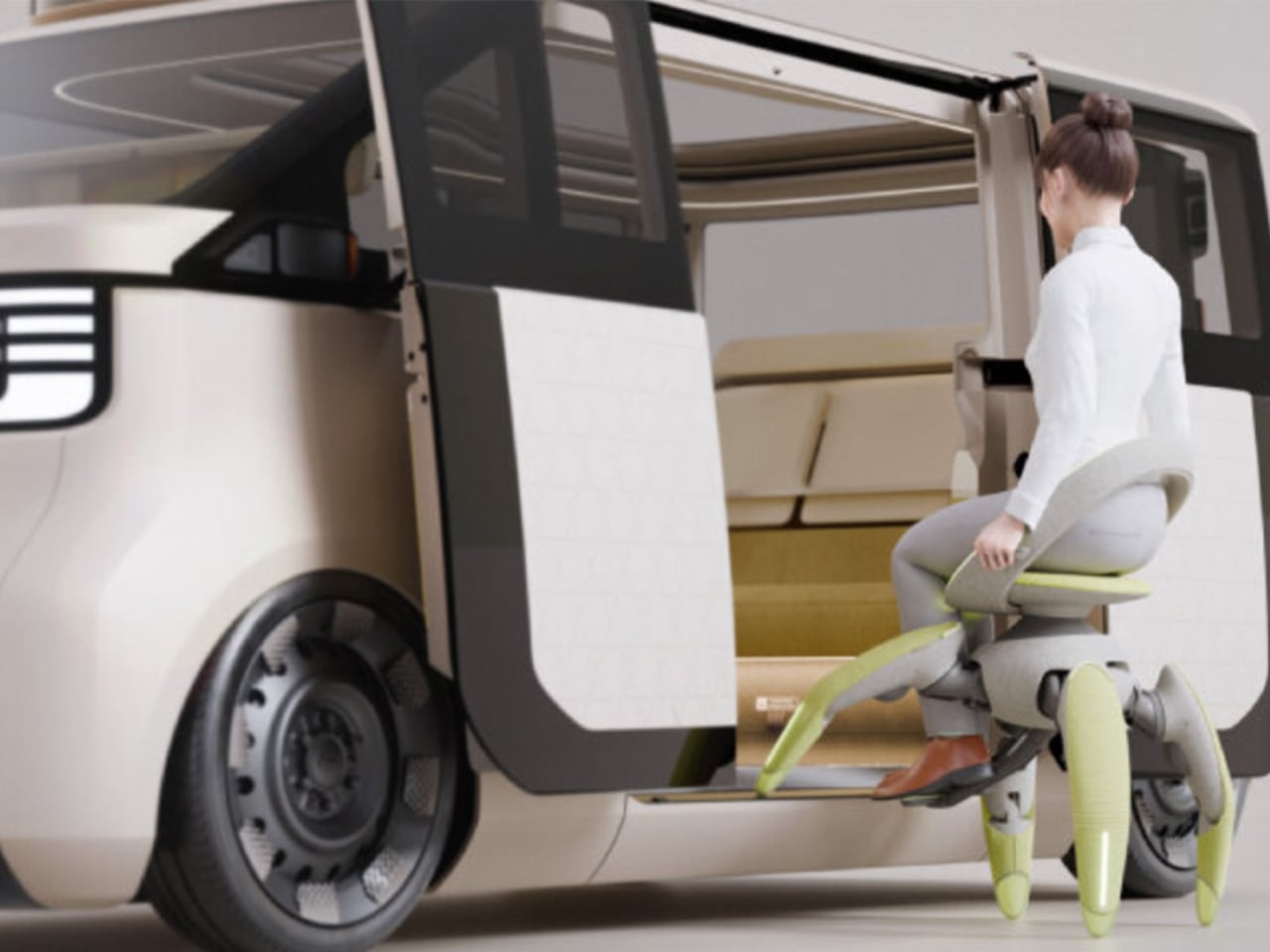Stairs have long been the nemesis of wheelchair users, turning simple errands into logistical nightmares and limiting access to countless spaces. Toyota’s answer to this mobility challenge doesn’t roll on wheels at all. Instead, the Walk Me concept, unveiled at the Japan Mobility Show 2025, walks on four robotic legs that can climb stairs, navigate uneven terrain, and fold themselves into carry-on luggage when not in use.
Designer: Toyota
A New Kind of Movement
Walk Me replaces traditional wheelchair wheels with biomimetic robotic limbs inspired by goats and crabs, animals known for their sure-footed navigation of challenging terrain. Each of the four independently motorized legs is covered in soft, pastel-colored material that hides the hardware and sensors underneath, making the technology feel approachable rather than clinical. When Walk Me encounters stairs, the front legs test the step height before pulling the chair upward while the rear legs generate thrust and support, creating a smooth climbing sequence that maintains user stability throughout the ascent.
LiDAR sensors and cameras continuously scan surroundings, allowing the chair to navigate obstacles like rug edges, scattered toys, and threshold transitions between rooms. Weight sensors ensure the user remains centered before any major movement, while collision radars stop the chair immediately if something crosses its path. Even when balance shifts unexpectedly, the system automatically widens its stance and adjusts the seat position to prevent tipping.
Comfort, Control, and Autonomy
Walk Me’s seat is designed to adjust to the user’s shape. The curved backrest supports the spine, while small side handles allow for manual steering. Users can twist the handles to turn or press integrated buttons for direction control.
For hands-free operation, voice commands like “kitchen” or “faster” enable the onboard computer to map a path or adjust stride speed. A small display on the armrest shows battery level and distance traveled, keeping essential information at a glance. The system uses smart algorithms and balance control to ensure smooth movement across complex surfaces.
The entire chair operates on a compact battery hidden behind the seat, which provides enough power for a full day of activity. Charging is as simple as plugging it into a wall outlet overnight. Built-in sensors monitor every joint, and if overheating occurs, the chair automatically shuts down and notifies the user.
Compact Design for Daily Life
Perhaps Walk Me’s most striking capability is its folding mechanism. With a single button press, the legs retract telescopically, the knees bend, and the chair compacts itself into carry-on size within thirty seconds. This makes it convenient to store in a car trunk or beside furniture, and when reactivated, the legs extend again while the balance system recalibrates automatically.
The chair’s adaptability extends to vehicle transfers and traditional Japanese living spaces. Walk Me can lift users into vehicles by raising itself on tiptoes, aligning with car doors, and tilting forward to facilitate seamless transfers without assistance or transfer boards. On tatami mats, the legs squat down to lower the seat to mat level, accommodating the floor-sitting culture common in Japanese homes.
Toyota designed Walk Me for practical, real-world use, from Japan’s elevated homes and narrow hallways to outdoor garden paths. The concept addresses the everyday challenges faced by people with reduced mobility, whether climbing stairs, moving over uneven ground, or transitioning into vehicles. By merging robotics, AI, and human-centered design with biomimicry principles, Walk Me represents an approach to assistive technology that prioritizes independence across diverse environments.
Beyond Prototype Status
Walk Me remains a prototype with no announced production timeline. Yet its debut at the Japan Mobility Show 2025 suggests a future where assistive devices are not limited by terrain, architecture, or even wheels. By replacing traditional mobility solutions with intelligent, lifelike motion, Toyota’s Walk Me challenges existing designs fundamentally and offers not just movement, but freedom.
The post Toyota Walk Me: The Robot Chair That Climbs Stairs and Folds Into Your Trunk first appeared on Yanko Design.

